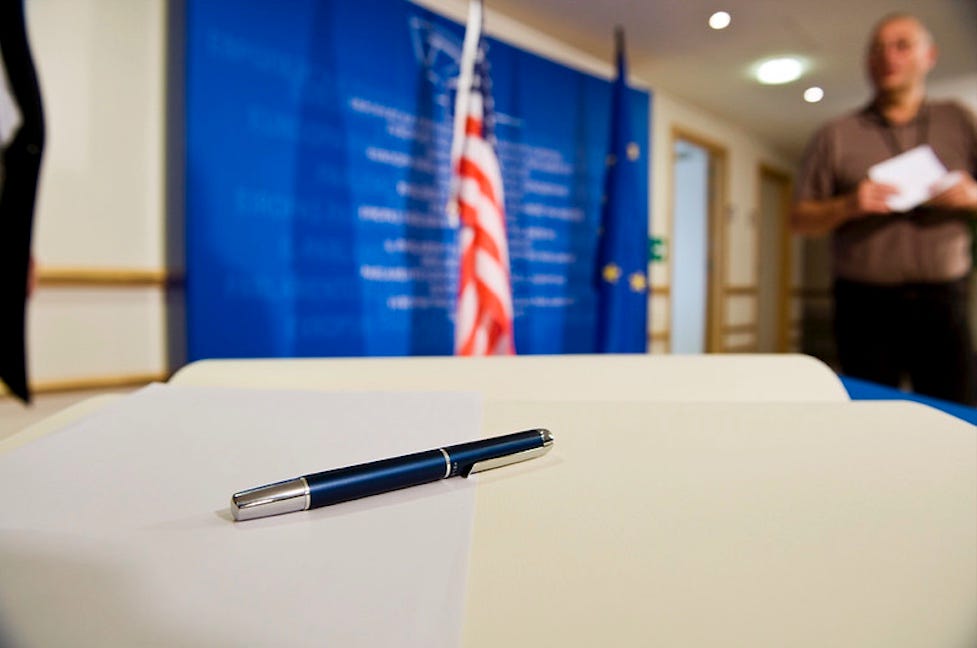'We are not going back to the Obama years' -- EU Notebook
EU Climate Commissioner Frans Timmermans and others see huge opportunity with President Biden and John Kerry, but just re-joining the Paris Accord isn't enough
By Vish Gain
(Vish Gain is a journalist based in Dublin. He is a correspondent for AML Intelligence covering the financial crimes sector in Europe and beyond.)
DUBLIN (Callaway Climate Insights) — All eyes are now on John Kerry, President Joe Biden’s pick for U.S. climate envoy. A champion of climate action, founding father of the Paris Agreement, and former U.S. secretary of state, Kerry will have to toughen up America’s domestic emissions reduction and take on the mantle of re-establishing U.S. climate leadership in the world.
Today, the Paris Agreement is considered a baseline for climate action — but most scientists agree it is not enough to avert the impending crisis. The U.S. will have to align itself with aggressive and ambitious climate policy frameworks such as the EU’s to induce momentum.
Europe’s Green Deal is one such framework. The European Commission says “a shared transatlantic commitment to a net-zero emissions pathway by 2050 would make climate neutrality a new global benchmark in the run-up to COP26,” the UN climate change conference to be held in Glasgow in November.
But such a commitment would require substantial investment, innovation and the right price signals.
“This is why we should work closely together on emissions trading, carbon pricing and taxation,” said the commission, pointing to the upcoming EU Carbon Border Adjustment Mechanism. The WTO-compatible mechanism to avoid carbon leakage is “an opportunity to work together to set a global template for such measures.”
This is part of a wider transatlantic green trade agenda which the commission proposes launching in mid-2021 that could also jointly develop a trade and climate initiative within the WTO.
Europe is going all-in with its offer to collaborate with the U.S., having proposed a transatlantic regulatory framework for sustainable finance to boost green investments in the private sector — with lessons from the success of the EU taxonomy.
Also in its hamper basket is a proposed joint effort against deforestation, ocean protection, brokering a global plastics treaty, and a green tech alliance to create markets for clean and circular technologies such as renewables, grid-scale energy storage, clean hydrogen, and carbon capture, storage and utilization.
The proposals are stamped with Europe’s trademark unfettered ambition, but if the U.S. is to regain leverage in the world of climate leadership, the EU is a force to be reckoned with.
If Biden and his Kerry can find ways to overcome domestic climate problems, America’s pathway to rebranding its image internationally seems to have been paved by European leaders with much enthusiasm.
Frans Timmermans, the EU’s Green Deal chief, said during an event on Monday he saw a “huge opportunity” to work with the Biden administration.
“But we also have to take into account the United States coming back to the international scene, in terms of wanting to contribute to multilateralism again, [at a time when] it’s a different world. So we are not going back to the Obama years,” he said.
If the U.S. and EU can align their priorities, he added, “the Chinese will want to show that they are ambitious as well and that will really create a positive momentum leading up to Glasgow.”
Hours before Biden’s inauguration, European Council President Charles Michel tweeted: “On the first day of his mandate, I address a solemn proposal to President Joe Biden: Let’s build a new EU-U.S. founding pact. For a stronger Europe. For a stronger America. For a better world.”
The world looks on as Biden takes the reins and Kerry prepares to reignite America’s role at the vanguard of climate action. But after four years of physical and moral absence, much more is needed much faster from America this time around: the world is still getting warmer, polar ice caps are melting, sea levels continue to rise. After all, time and tide wait for no man.
Repairing trust
As we watched Biden take his oath as the 46th President of the United States, climate activists on both sides of the pond were cautiously optimistic about the future of US-EU collaboration on climate action.
A prodigal return to the Paris Agreement, top of the agenda on Biden’s day one, is being hailed by many as a stepping stone to recalibrating the global fight against climate change. But what we all know is that a simple re-entry into the agreement and restoring the pre-2016 status quo is not enough to make up for the tragically lost time.
Here in Europe the past four years under Donald Trump has been devastating for America’s reputation and trust in the eyes of the climate policymakers. Elsewhere the world has been trudging on in the good fight: From South Korea to South Africa, China to Japan, countries around the world are now lining up to commit to a net-zero future. The EU itself now has an ambitious 55% emissions reduction plan for 2030.
For now, the US has no such plan. If Biden were to make the same commitment, two-thirds of the global economy and more than half of the world’s emissions would be accounted for.
It’s not hard to see the powerhouse of a bloc the US and EU could be if they joined hands in leading the world’s climate movement. Together, the two advanced democracies are home to almost a billion people, account for about a third of global GDP and 60% of the world’s foreign direct investment.
Multilateral action spearheaded by this united bloc could be the best shot we have to stop the growing tides of climate change.

